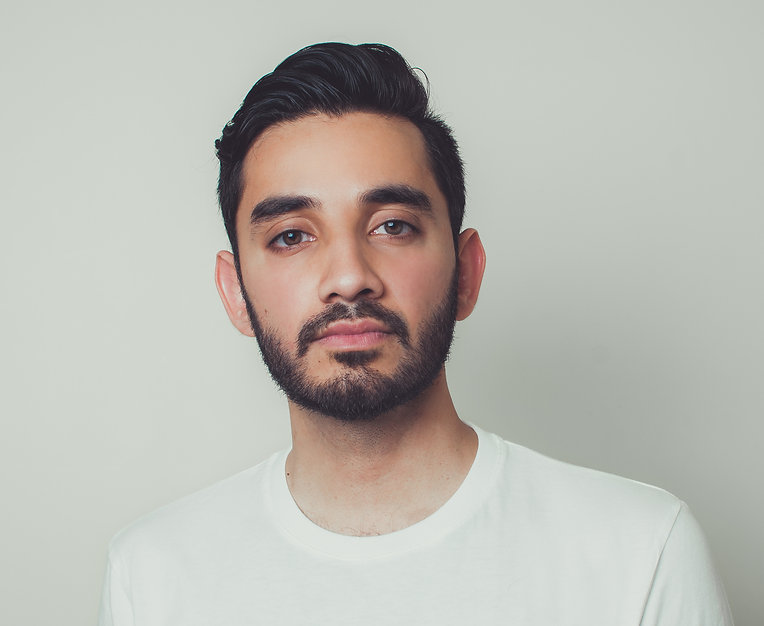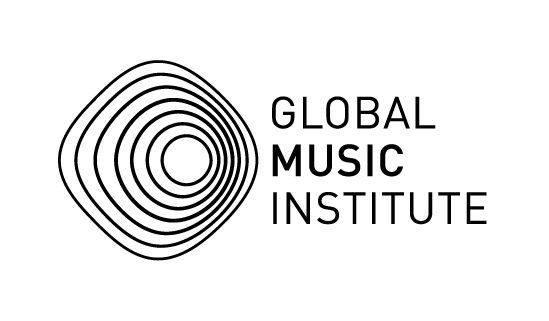
23 Dec Artist Spotlight: Shubh Saran
The artist spotlight series aims to dive deep into the world of contemporary musicians to learn about their stories. Through these conversations, we explore their humanity, personality, musicality, and artistry. The first feature brings to you our conversation with New-York based guitarist, and composer, Shubh Saran.
This interview has been edited and condensed for length and clarity.
Ikigai is a Japanese concept meaning that which gives your life worth, meaning, or purpose. What’s your ikigai?
I’ve actually thought about this a lot as a musician– especially in the column of what the world needs. It is difficult to think about the work you do as a musician in terms of what the world needs and how you fit into society, what role you have in society. The only thing I land on is that artists, musicians and creative people sit outside of society, and you have to comment on the rest of the world as an observer. That goes for how we get paid and how we work because it is so different from everybody else’s work life and financial life. Everyone has an inherent need to feel a sense of purpose and I have been thinking about this a lot in the past two years in COVID when I didn’t have any work. I found myself needing to be obsessed with something and I needed to do something that was objectively hard. The idea of creating things is exciting. It drives me and gives me a sense of belonging and purpose.
How would you describe your connection to music? What does it mean to you? What do you value most about music?
When you ask me this question, I think back to when I was a kid because that is when I was most innocent. Back then, it was a way for me to find my thing. I wasn’t sporty, or studious, so music was the thing that I could do. I started making music immediately and at the time I was making stuff that no one else had made, even though it wasn’t all that great. The idea of doing something that no one else had done was exciting very early on, and through that I created a little world that I lived in— a little space that I exist in, according to my sensibilities. Through that I have created a whole life of incredible friends, a massive community and my day to day is surrounded by music and basically playing more music. My connection to it now is many fold- it’s my whole life.
You have spoken extensively about growing up across six countries. Is there a place where you feel like you are ‘home’? What does home mean to you?
That’s a hard question. You know I think there is a difference between a physical home and an emotional home. New York definitely feels like home because it’s the place where my music career became a thing. It feels like home because it’s a thing you have built. But New York as a city is so diverse and so big that it always feels too big for me. You don’t feel like you belong to New York, or you represent New York. It’s more like you take a little bit of New York with you. As for an emotional home, I think it’s delhi. As an Indian person who is brown and grew up in an Indian household, those values or cultures very much permeated into how we were raised. Now when I interact with other Indians, there is a sense of commonality in how we were raised, especially if you were from a particular part of India. I think that the genes of an idea sort of stays- how families were raised, how families think about love, how you express it, how you think about relationships… There is an Indianness to it. When I go back to India I feel like a fish out of water for sure. But my parents live there, and there is a familiarity in the culture that I can understand. That’s why India feels like an emotional, intangible home. New York is home though. I guess Delhi and New York.
How is Shubh the performer different from Shubh the composer?
I interpret it more as me composing music for myself, and me as a working musician making a living. I have never thought of myself as a virtuosic guitar player. But as a performer there is a vocabulary to it that is present among guitar players in the style I exist in but I don’t think I am a good representation of that at all. I haven’t spent enough time in any genre to be representative of a certain genre like jazz or blues- there are holes in my vocabulary in each of these places. As a composer, I feel like I don’t have to fake anything. The idea is to be as authentic as possible- my limitations and my strong points are both a part of my authenticity as a composer. In me trying to imitate how to write like a certain artist, I am trying to be versions of myself I think I am but I end up creating what I authentically am- something I am finding out more and more about. As a composer there is a freedom to it because I feel like I don’t need to fit into any box. Whereas as a performer, I think there is a little bit of fitting in.
As a performer I like to be really collaborative and play music with many people- I love the spontaneous moments that happen on stage. My compositional techniques are much more personal to me and my guitar playing- the way my fingers sit on my guitar inform the way I write. Composing is very introspective and happens alone in my home studio setup. But performing, I like to do it big and with a lot of people.
Aside from musical influences, are there artists and pieces of art from other mediums such as visual art, literature, and cinema that have influenced you? If so, what are they and in what way do they speak to you?
Books inspire and inform the things I want to write about, speak about, want to make music about. For this record, I started reading a lot about identity and this was before I knew that the record was going to be about identity. There is one book in particular that helped shape a lot of the song titles— a book called ‘Decolonising Psychology’ by Sunil Bhatia. He writes about the Indian-American psyche and it’s about Indianness in the western world. It informed the arguments I was trying to make and what I was trying to say. H.A.D.D. and Hmayara were informed a lot by books about comparative religion because I went into a deep dive of reading books about religion, and religious history. The idea of religion as a thing was super fascinating. So each record is very influenced by the things I am reading about- immersing myself in a few small ideas that germinate.
Identity and cross-cultural exchange has been a common theme in your body of work. You have said ‘Inglish’ is your most personal album till date- how so?
It’s the most obvious record about me and my identity. I think everything else has been hinting at ideas of identity in little bits and this isn’t intentional. By the time I got to Inglish, I was finally able to articulate some of the things I was trying to say and realise that myself in the process. In that way it is the most personal because it is most overtly about Indianness, identity, moving around, assimilation, and acculturation. The titles are about that and the sound of the music is also about that. I think there is a version of me that was not represented in my other records that is represented in this record. Not just about the Indian part of me, but also my complex relationship with my Indianness.
The overall sound of ‘Inglish’ is very textured, layered, dynamic, and almost larger than life. Where did you begin with this project and how did it grow into what we hear now?
It leaned heavily into the introspective side and that was partly because it was during COVID so there wasn’t any opportunity to be collaborative. It very much started as a way for me to get up in the morning and have something to do. I started writing this music a week into the lockdown and I needed to do something. That’s how the writing process started. The initial ideas of the songs and the demos were just me on my computer. When I started layering and adding production elements, there was a world of me figuring out semi-modular analog synth stuff. I had two synths I hadn’t used together and got into modular synthesis. So a lot of the record is based around those kinds of things and it was a personal study into that. In the end when it came time to record the record, and have people replace the instruments I demo-ed, the drummers especially came up with a lot of the grooves and a lot of splitting the parts between the two drum sets, the sax players finessed a lot of the parts and the keys player did a lot of the synth production on his own at his home studio. In the final stages of post-production, there was a lot more individual contribution.
What prompted you to create the podcast ‘Off stage with Shubh’? What was your intent behind this project?
The main idea to start the podcast was to create a ‘Song Exploder’ podcast series for each song in the album- which is what I am working on now. When I started writing about what the songs are about, I thought I have to write about what the theme is. Then I thought, why don’t I make a podcast and I can get some people to corroborate some of the things I am saying. I asked a bunch of people and 17 different people said yes. Thereon it started to take shape, and in the end it became an interview style format where we talked about the themes with all these different people and they were the primary sources. I tried to use music and Indianness as a vehicle to talk about identity. I was afraid of stretching myself into territory I couldn’t speak on, so it had to be very personal and extremely musical because it is the only thing I have authority on.
With the release of ‘Inglish’, you have gotten back to touring for the first time since the start of the pandemic. How has that experience been? Are there any distinctive differences you have felt between pre-pandemic, and post-pandemic touring?
Hundred percent. I did a tour with Sungazer in August, which is my friend Adam Neely’s band. We played at a time when it was summer and it was like “COVID’s over so go out and basically be free!” That was crazy and it was like… “we’re back!” But my tour, which we did a few weeks ago, was after that where everything opened but then everything was closed again so it was like… are we open are we not? Touring in that environment was interesting because there was a sense of, “I don’t know how long this is going to last.” With this tour I realised that the schlepp is a really real part of being a musician and we forgot how to do that. I didn’t realise that was a skill I had learned on the job. There was an endurance that existed with touring musicians and we forgot how to endure gruelling schedules– so it was much more exhausting and physically taxing. Because of everything we have gone through over the last few years, I am really apprehensive of the whole thing. There is a sense of ‘will it be taken away?’ and ‘will it just go?’ We don’t know what’s going to happen, and when the world is going to shut down, we don’t know what is going to happen in six months… there is a hesitancy about getting excited.
With an extensive touring schedule, releases, and so much other work in the pipeline, how do you preserve your mental health and prevent burn out?
You have caught me at a time where I am pretty burnt out so my answer now is that it is inevitable. For me, a lot of it is about looking forward to what’s next. I feel like I need to move on and do the next thing and that’s the thing that helps me stay motivated. A lot of the time it is not writing music because once I have released something, there is a period where I am not writing music at all. Filling my time with something in that period and finding something that is equally fulfilling, that drives you and gives you a sense of purpose, is important. Because there is a deep loss in your sense of purpose right after you have released music. At least that’s what I have found. Burnout is inherent in the process of creating- where you have a massive high, it is almost inevitable that you will have a massive low. Because it is inevitable, I don’t think ignoring it is the answer. Accepting that it is a reality, and finding ways to combat that reality is important. If you do feel depressed or anxious, finding the right ways to deal with that is really critical. And in that respect, that is not something a lot of people who are musicians actually do because a lot of the things that comes with being burnt out as a musician is ‘am I not good enough to do this?’ So with musicians, it is so tied to your sense of being. It’s so interconnected that it becomes very difficult to distance yourself and realise that ‘I am not feeling great because mentally I am not in a good place,’ and not ‘I am not feeling great because I am not great at what I do.’ I wish there was more of a conversation about this where we say it is okay if you are burned out and it doesn’t mean you are a lesser musician than your friend who is not burned out and making a record. You are allowed to not make a record and you are allowed to chill.
What keeps you going?
I think it’s getting up and wanting to do something cool and exciting, something interesting. I like learning new stuff. I want to have a life where I can create music under my own name and have that be the thing I do. I love all the side musician things I do- it’s awesome and it has taught me everything I know. But I want to work towards a place where the music I make can be the thing that I do and that is a big motivator for me. In order to do that, I have to have music out there for people to listen to, I have to make enough money… There are all these extraneous things that inform that but the central goal is that I want to write music and have that be my life. I want to write and play music.
Where do you see yourself musically, moving forward? What’s next for Shubh Saran?
I am thinking about keeping the podcast going which is an ambitious thing but that’s what I am telling myself and telling everybody else, so I have to do it! There’s two episodes a month starting January. In the first series, there will be a few episodes on song breakdowns– how I came up with the songs, and the different layers. Then I want to go onto just musician things for musicians. One of the ideas I have is talking about your life in COVID, and what you learned. Again, I want to go to the interview format which I really enjoyed. I want to spend the next year pushing this record out in different ways, touring, and rethinking the touring strategy. The next challenge, if the podcast release becomes its own thing, is going to be figuring out how to do that while figuring out the music thing and streamlining the process.
You can follow Shubh on Spotify and Instagram.
Interviewed and edited by Senjuti Maitra




No Comments